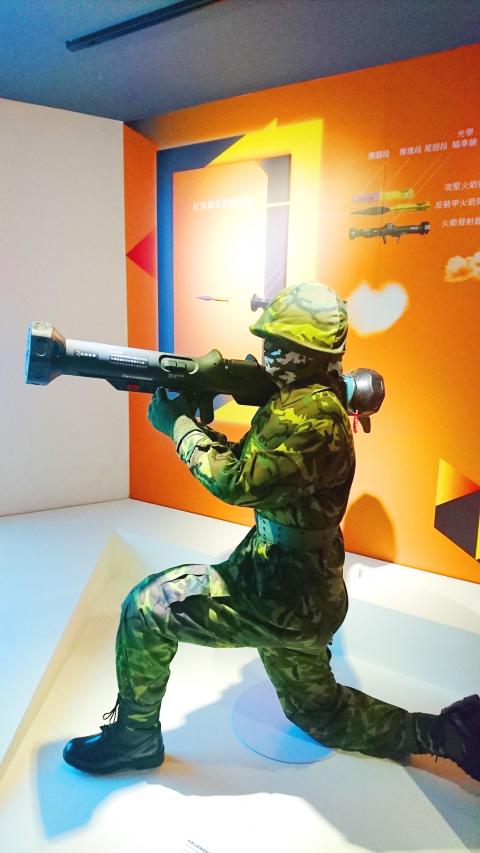Nearly 400 domestically produced Kestrel missiles have been deployed in Taipei to protect key government infrastructure in the event of attacks by China’s People’s Liberation Army, and more missiles would be purchased next year, the Military Police Command said in its annual budget report submitted to the Legislative Yuan yesterday.
The Kestrel missile launcher is a disposable, shoulder-launched, single-shot system that can fire a high-explosive anti-tank warhead or a high-explosive squash head.
The command deployed the first of them in the capital in October as part of a two-year program first announced last year.

Photo: Lo Tien-pin, Taipei Times
It has so far procured 397 missiles, 238 test missiles and five training simulators from the Chungshan Institute of Science and Technology, the command said.
The military has formed the Quick-Reaction Company at the 202nd Military Police Regional Command and garrisoned additional forces in the city, which would allow it to respond quickly in the event of a threat to the central government, the command said.
The missile systems cost NT$43.03 million (US$1.41 million), it said, adding that next year the command plans to purchase 48 more missiles, 40 test missiles and three training simulators, which would cost of NT$5.97 million.
With the lightweight launchers, which could be deployed in high-rises or transported in vehicles, military police can launch mobile counterattacks in urban combat and retake crucial governmental structures, it said.
The missiles could destroy armored vehicles as well as enemy morale, it said.
Its decision to purchase the missile systems was made after carefully considering the “threat posed by the enemy,” the command said.

INVESTIGATION: The case is the latest instance of a DPP figure being implicated in an espionage network accused of allegedly leaking information to Chinese intelligence Democratic Progressive Party (DPP) member Ho Jen-chieh (何仁傑) was detained and held incommunicado yesterday on suspicion of spying for China during his tenure as assistant to then-minister of foreign affairs Joseph Wu (吳釗燮). The Taipei District Prosecutors’ Office said Ho was implicated during its investigation into alleged spying activities by former Presidential Office consultant Wu Shang-yu (吳尚雨). Prosecutors said there is reason to believe Ho breached the National Security Act (國家安全法) by leaking classified Ministry of Foreign Affairs information to Chinese intelligence. Following interrogation, prosecutors petitioned the Taipei District Court to detain Ho, citing concerns over potential collusion or tampering of evidence. The

NEGOTIATIONS: Taiwan has good relations with Washington and the outlook for the negotiations looks promising, Minister of Economic Affairs J.W. Kuo said Taiwan’s GDP growth this year is expected to decrease by 0.43 to 1.61 percentage points due to the effects of US tariffs, National Development Council (NDC) Minister Paul Liu (劉鏡清) said at a meeting of the legislature’s Economics Committee in Taipei yesterday, citing a preliminary estimate by a private research institution. Taiwan’s economy would be significantly affected by the 32 percent “reciprocal” tariffs slapped by the US, which took effect yesterday, Liu said, adding that GDP growth could fall below 3 percent and potentially even dip below 2 percent to 1.53 percent this year. The council has commissioned another institution

NEGOTIATIONS: The US response to the countermeasures and plans Taiwan presented has been positive, including boosting procurement and investment, the president said Taiwan is included in the first group for trade negotiations with the US, President William Lai (賴清德) said yesterday, as he seeks to shield Taiwanese exporters from a 32 percent tariff. In Washington, US Trade Representative Jamieson Greer said in an interview on Fox News on Thursday that he would speak to his Taiwanese and Israeli counterparts yesterday about tariffs after holding a long discussion with the Vietnamese earlier. US President Donald Trump on Wednesday postponed punishing levies on multiple trade partners, including Taiwan, for three months after trillions of US dollars were wiped off global markets. He has maintained a 10 percent

TRADE: The premier pledged safeguards on ‘Made in Taiwan’ labeling, anti-dumping measures and stricter export controls to strengthen its position in trade talks Products labeled “made in Taiwan” must be genuinely made in Taiwan, Premier Cho Jung-tai (卓榮泰) said yesterday, vowing to enforce strict safeguards against “origin laundering” and initiate anti-dumping investigations to prevent China dumping its products in Taiwan. Cho made the remarks in a discussion session with representatives from industries in Kaohsiung. In response to the US government’s recent announcement of “reciprocal” tariffs on its trading partners, President William Lai (賴清德) and Cho last week began a series of consultations with industry leaders nationwide to gather feedback and address concerns. Taiwanese and US officials held a videoconference on Friday evening to discuss the